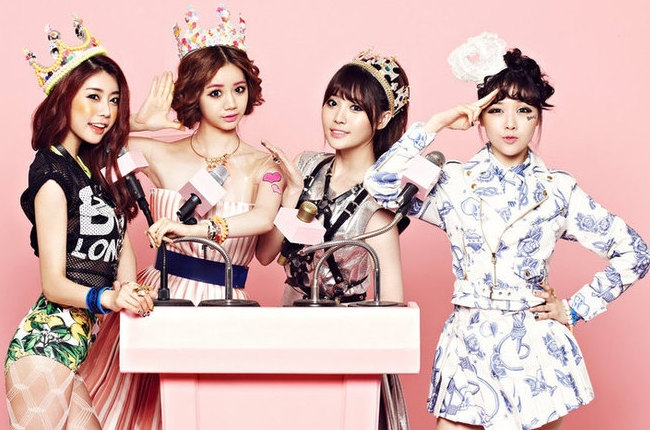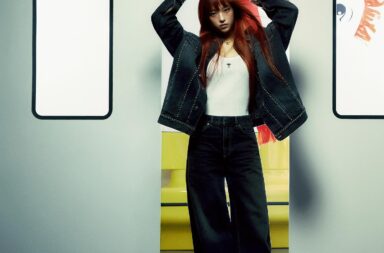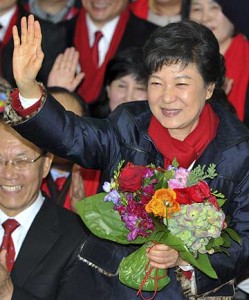 2012 and 2013 have been momentous years for South Korea’s political landscape. Unless you’ve been living under a rock Patrick Starfish-style, you’ll likely have taken note of the fact that Park Geun-hye, a longtime National Assembly representative of the conservative New Frontier Party (also known as 새누리당, the Saenuri Party, and formerly known as 한나라당, or the Grand National Party) won the December 2012 presidential election by a narrow margin and became the first female president of South Korea. Though she cuts a rather controversial figure (being the daughter of one of South Korea’s most simultaneously revered and reviled military dictator will do that to you — and indeed, the opposition progressive Democratic United Party [민주당, the Minju party] has often accused Park Geun-hye of riding her father’s coattails to power), it is difficult to deny that having a woman in CheongWaDae (청와대, or the Blue House) is nothing short of revolutionary in South Korea.
2012 and 2013 have been momentous years for South Korea’s political landscape. Unless you’ve been living under a rock Patrick Starfish-style, you’ll likely have taken note of the fact that Park Geun-hye, a longtime National Assembly representative of the conservative New Frontier Party (also known as 새누리당, the Saenuri Party, and formerly known as 한나라당, or the Grand National Party) won the December 2012 presidential election by a narrow margin and became the first female president of South Korea. Though she cuts a rather controversial figure (being the daughter of one of South Korea’s most simultaneously revered and reviled military dictator will do that to you — and indeed, the opposition progressive Democratic United Party [민주당, the Minju party] has often accused Park Geun-hye of riding her father’s coattails to power), it is difficult to deny that having a woman in CheongWaDae (청와대, or the Blue House) is nothing short of revolutionary in South Korea.
I’ve harped on it countless times before, but South Korea is just not a spectacular place to be a woman. With an atrocious gender wage gap, more or less institutionalized sexism when it comes to hiring and promotions, and a whole host of problems related to the tension between raising a family and pursuing a career, South Korea’s poor gender rights record is often cited as an anomaly among OECD countries. That a woman managed to take the election is meaningful, even if such meaning is nuanced or requires that it be contextualized within Park’s background and inherited legacy. Some have even gone so far as to declare that it signifies a watershed in how Seoul will handle women’s rights issues from here on out. You hear that, ladies? A watershed! Change is just around the corner!
What sorts of things might change now that South Korea has a female president, you ask? Well, for starters, girls, you can now…uh…kiss men first! And tell them that you love them before they say it! YEAH! FEMALE EMPOWERMENT! Hi-yah!!!
[youtube http://youtu.be/P-RZLl5X750]Mmhmm. Revolutionary. I can almost hear the people sing. Oh wait — those people are just the four ladies of Girl’s Day, who are currently promoting their latest single, a “girl power” anthem called “Female President.” Ostensibly, this song and video are intended to celebrate the awesome novelty that is a potential end to sexism in South Korea, and boy, does it ever!
Or not. Actually, it just celebrates the same foolish inanity that does nearly every girl group music video ever created: women whose “empowerment” is couched entirely in how they behave relative to men — who, despite being entirely absent from this music video, are still the object of every single action taken by Girl’s Day as the video progresses.
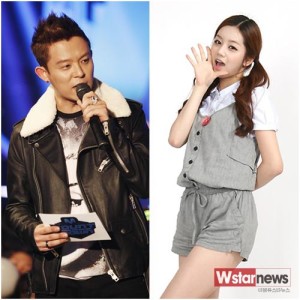 I have to admit, I have never been super keen on Girl’s Day. Along with other third tier girl groups like A Pink, Dal Shabet, and Rainbow, I could never quite place them or recognize the members — and since Girl’s Day has undergone a not insignificant number of member changes since their debut, I don’t think I can be held entirely blameless for that one. But whether or not Hyeri’s relationship with a much-older Tony Ahn is nothing more than a sponsorship deal masquerading as young love (snicker), it has undoubtedly thrust them into the spotlight and perhaps even bolstered the attention that their comeback has received. Add to that a sexy, smoky teaser and a kitschy title (come on, you know I couldn’t resist a song called “Female President”) and bam, you have a highly anticipated release.
I have to admit, I have never been super keen on Girl’s Day. Along with other third tier girl groups like A Pink, Dal Shabet, and Rainbow, I could never quite place them or recognize the members — and since Girl’s Day has undergone a not insignificant number of member changes since their debut, I don’t think I can be held entirely blameless for that one. But whether or not Hyeri’s relationship with a much-older Tony Ahn is nothing more than a sponsorship deal masquerading as young love (snicker), it has undoubtedly thrust them into the spotlight and perhaps even bolstered the attention that their comeback has received. Add to that a sexy, smoky teaser and a kitschy title (come on, you know I couldn’t resist a song called “Female President”) and bam, you have a highly anticipated release.
So how did they do? Put it this way: it was a nice idea, but the execution was a disgrace.
First, we have the aesthetics of the video itself. As is more or less par for the course by now, the video is chock full of bedroom eyes and sexy sexiness from start to finish — it’s so typical that it’s almost boring. I know that people are unhappy with the way the girls were styled (that skin-colored full body unitard? Yeah, no), but that’s a tough bone to pick in this case — because nobody except the stylists involved, the girls’ management, and the girls themselves know whether or not the outfits were selected to enhance the pleasure of male viewers or to demonstrate the sexual liberation of women thanks to Park Geun-hye, it doesn’t seem like a can of worms worth opening to take issue with the wardrobe. How one interprets the song really colors the way one will interpret nearly everything associated with it, and so I’ll leave that one up to the individual viewer. But any way you look at it, HEY LOOK AT MY SEXY SELF isn’t really an original concept.
Moving on, the opening scene features the members stripping (or at least removing some articles of clothing, as we have no way of truly confirming if they left anything on) from behind screens, and I would almost find it interesting if Beyoncé hadn’t done it in her video for “Naughty Girl” long ago. Imitation is the sincerest form of flattery, but really, Girl’s Day? You couldn’t think of anything else? The rest of the video isn’t remarkable by any stretch — we are treated to alternating dance sequences, close ups, an inexplicably-placed car (why, why always the car?), and the portrayal of what I assume is supposed to be a romantic relationship by a feminine Minah and an androgynous, suit-wearing Hyeri. This was an interesting decision, I’ll give it that, and the video very nearly concludes with a risque kiss between the two — one that is evidently initiated by an “empowered” Minah, who grabs Hyeri’s tie and pulls her toward her. Saucy!
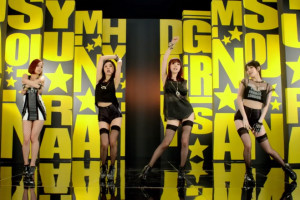 Let’s take a moment to talk about Minah’s “empowerment.” If you’ve read or understood the song’s lyrics, you’ll have figured out pretty quickly that the song really has absolutely nothing to do with Park Geun-hye or a female president. In fact, the mention of a female president pretty much only serves as a justification for a woman being more straightforward in her relationship with a man.
Let’s take a moment to talk about Minah’s “empowerment.” If you’ve read or understood the song’s lyrics, you’ll have figured out pretty quickly that the song really has absolutely nothing to do with Park Geun-hye or a female president. In fact, the mention of a female president pretty much only serves as a justification for a woman being more straightforward in her relationship with a man.
And you know, I really don’t have a problem with that message — sometimes, women have to take initiative to get what they want, and that’s something that I can get behind. Except…really? South Korea has a female president now and all you can think about is how this impacts you in your pursuit of a boyfriend? Women could have very well taken the reins in their relationships prior to Park Geun-hye’s election; they were physically and mentally capable of that. In fact, the only block on them actually doing that was likely the relationship culture propagated by aegyo-laden girl group music videos and songs that advised women to play coy, giggle, and twirl around for oppa’s amusement.
What they couldn’t do, however, was earn the same pay as a man for the same job, or get a legal abortion unless the mother’s life is in peril, or see a proper payoff for their investment in higher education (South Korea manifests a particularly strange sociological trend in that women invest a lot in pursuing a college degree, but that investment is not reflected in their low rate of participation in the labor market). So kudos, Girl’s Day, for using a momentous political event that could have serious ramifications for South Korea’s firmly entrenched patriarchy as a springboard to ask us if it is a crime for a woman to kiss a guy first. Of course it isn’t, but (and not to belabor the point) guess what is actually a crime? Abortion. So…there’s that.
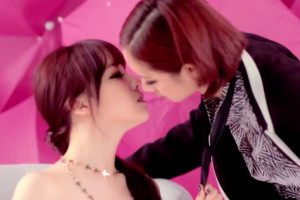 But what really gets me, as it always does, is that even if one chooses to accept the very limited message of empowerment present in the song (it was probably just a pipe dream to hope that it would actually address real and pressing concerns), half of the lyrics coupled with that bizarre on-screen portrayal of romance between Minah and Hyeri completely and utterly undermine that. To address the first, though some of the lyrics talk about women being go-getters for once in their interactions with men, the other half talk about how dizzy and nervous and unable to open their eyes they are in front of the object of their affections. They just feel worthless and like babies, they cry! For everyone knows that women in general are just worthless children unless they are loved by a man.
But what really gets me, as it always does, is that even if one chooses to accept the very limited message of empowerment present in the song (it was probably just a pipe dream to hope that it would actually address real and pressing concerns), half of the lyrics coupled with that bizarre on-screen portrayal of romance between Minah and Hyeri completely and utterly undermine that. To address the first, though some of the lyrics talk about women being go-getters for once in their interactions with men, the other half talk about how dizzy and nervous and unable to open their eyes they are in front of the object of their affections. They just feel worthless and like babies, they cry! For everyone knows that women in general are just worthless children unless they are loved by a man.
Additionally, for all of their talk of women holding the power in a relationship and making all the moves first, we are treated to scenes of Minah giggling coquettishly at man-Hyeri’s affections, or eating a cupcake that man-Hyeri feeds her. I’m sorry, is this supposed to be different from some of the other drivel that K-pop has fed us related to a woman’s place in a relationship? Are we supposed to watch this and nod with approval, turning to our fellow ladies and saying, “Now, this is how you do it”? I’m so sure that this is what President Park had in mind when she thought about her long-term impact on South Korea’s young female generation.
“Female President” is ultimately a disappointment. This concept had so much potential to address a wide range of social problems related to feminism and femininity in South Korea, but instead treated us to an unpleasant reminder that women still ought to calculate their own self-worth based on their relationships with men. Worse still, the barely-there message of female empowerment is overshadowed by contradictory imagery and lyrics. Girl’s Day really had a golden opportunity here to tell women that now that South Korea has a woman in power, women should fight all the more against an oppressive and omnipresent patriarchy, but instead they just told us that now we can…kiss guys without holding back.
Thank you, Girl’s Day. You’ll never know how much you’ve impacted society. No, really, I mean that — you’ll never know because there was no impact.
